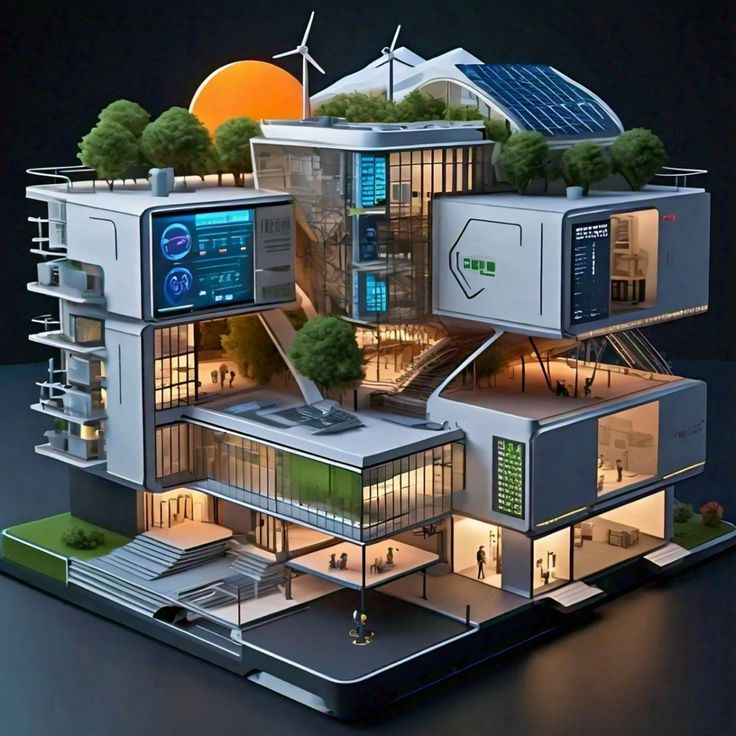Transforming Apartments with Smart Home Technology: A New Era in Urban Living
Read latest blogs and articles from Housystan

The Information mentioned here was last updated on:
21/2/2026Transforming Apartments with Smart Home Technology: A New Era in Urban Living
Introduction: The Rise of Smart Home Solutions in Urban Apartments
Urban living has always been synonymous with innovation, convenience, and adaptability. As cities grow denser and lifestyles become more fast-paced, apartment dwellers are seeking ways to enhance comfort, security, and efficiency within limited spaces. Enter smart home technology—a revolution that is redefining the modern apartment. With intuitive devices and seamless connectivity, residents are experiencing a paradigm shift in how they interact with their homes. This article delves into the transformative power of smart home technology in apartments, exploring its benefits, key features, and its impact on the future of urban living.
- Verified Tenants/Buyers
- Unlimited Property Listing
- Zero subscription/charges fee
The Smart Apartment: Beyond Traditional Living Spaces
Gone are the days when apartments were merely places to eat, sleep, and unwind. Today, smart home innovations are turning ordinary apartments into dynamic living environments. From voice-activated assistants and automated lighting to intelligent thermostats and advanced security systems, technology is making urban apartments smarter, safer, and more energy-efficient. This shift is not just about convenience—it's about creating a lifestyle tailored to the needs of the modern city dweller.
Core Features of Smart Home Technology in Apartments
1. Intelligent Lighting and Climate Control
Modern smart apartments are equipped with adaptive lighting systems that can be controlled via smartphones or voice commands. Residents can set schedules, adjust brightness, and even change the color temperature to match their mood or activity. Smart thermostats, such as the Nest or Ecobee, learn user preferences and automatically adjust the temperature, optimizing comfort while reducing energy consumption. These features not only enhance everyday living but also contribute to sustainability by minimizing wasted resources.
2. Advanced Security Systems
Safety is a top priority for urban residents. Smart home security systems offer peace of mind with real-time monitoring, motion sensors, and remote access. Features like video doorbells, smart locks, and window sensors allow apartment dwellers to monitor their homes from anywhere, receive instant alerts, and even grant access to visitors via their smartphones. This level of control and transparency is revolutionizing apartment security in city environments.
3. Seamless Connectivity and Automation
A defining characteristic of smart apartments is their interconnectedness. Devices communicate through platforms like Google Home, Amazon Alexa, and Apple HomeKit, enabling residents to automate daily routines. For example, a “Good Morning” command can trigger the blinds to open, lights to turn on, and the coffee maker to start brewing. This integration makes life easier, especially in compact urban spaces where efficiency is paramount.
4. Energy Efficiency and Sustainability
With growing awareness of environmental issues, many urban dwellers prioritize sustainability. Smart home technology addresses this by optimizing energy use through automated lighting, climate control, and smart appliances. Residents can monitor their energy consumption in real-time, set goals, and receive tips on reducing waste. Over time, these small adjustments contribute to lower utility bills and a reduced carbon footprint—an attractive proposition for eco-conscious city residents.
The Human Touch: Enhancing Quality of Life
While technology is at the heart of the smart apartment revolution, the ultimate goal is to improve the quality of life for residents. Smart home solutions cater to diverse needs, from busy professionals seeking efficiency to families prioritizing safety and comfort. Elderly residents and people with disabilities benefit from voice controls and automation, making daily tasks more manageable. The adaptability of smart devices ensures that everyone, regardless of age or lifestyle, can experience the advantages of modern urban living.
Smart Home Technology and Property Value
Property developers and landlords are embracing smart home technology as a means to attract and retain tenants. Apartments equipped with smart features often command higher rents and experience lower vacancy rates. Prospective renters and buyers are increasingly seeking homes that offer integrated technology, viewing it as a long-term investment in convenience and security. For landlords, smart systems can also simplify property management—remote monitoring, automated maintenance alerts, and smart access controls streamline operations and improve tenant satisfaction.
Challenges and Considerations in Smart Apartment Adoption
Despite its many advantages, the adoption of smart home technology in apartments is not without challenges. Privacy concerns remain at the forefront, as connected devices collect and transmit data about residents’ habits and routines. Ensuring robust cybersecurity measures is essential to protect sensitive information. Additionally, the initial cost of installing smart systems can be a barrier for some property owners. However, as technology becomes more affordable and user-friendly, these obstacles are gradually diminishing.
The Future of Urban Living: What’s Next for Smart Apartments?
The smart apartment movement is still in its early stages, but the trajectory is clear. As artificial intelligence and the Internet of Things (IoT) continue to evolve, apartments will become even more intuitive and responsive to residents’ needs. Future innovations may include predictive maintenance, advanced energy management, and personalized wellness features such as air quality monitoring and adaptive lighting to improve sleep and productivity.
Moreover, the integration of smart technology into building infrastructure will create connected communities, where residents can interact with shared amenities, access services, and participate in sustainability initiatives—all from their smartphones. This holistic approach will redefine urban living, making cities more livable, efficient, and inclusive.
Conclusion: Embracing the Smart Apartment Lifestyle
Smart home technology is not just a passing trend—it is a fundamental shift in how we live, work, and connect within urban environments. By transforming apartments into intelligent, adaptive spaces, technology empowers residents to enjoy greater comfort, security, and efficiency. As adoption continues to grow, smart apartments will set the standard for modern urban living, offering a glimpse into a future where our homes work with us, not just for us. For city dwellers seeking the perfect balance of innovation and livability, the smart apartment revolution is just beginning.